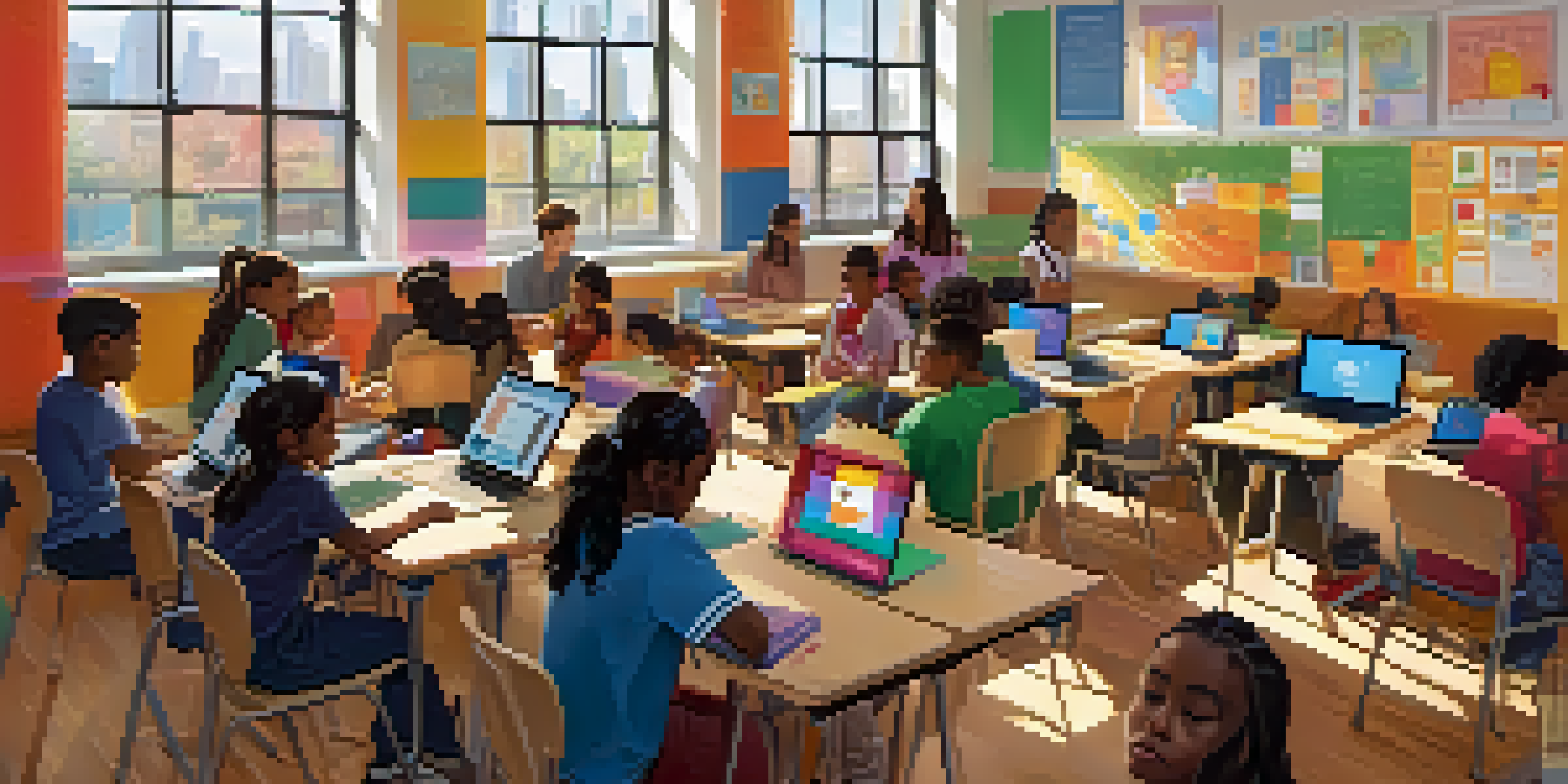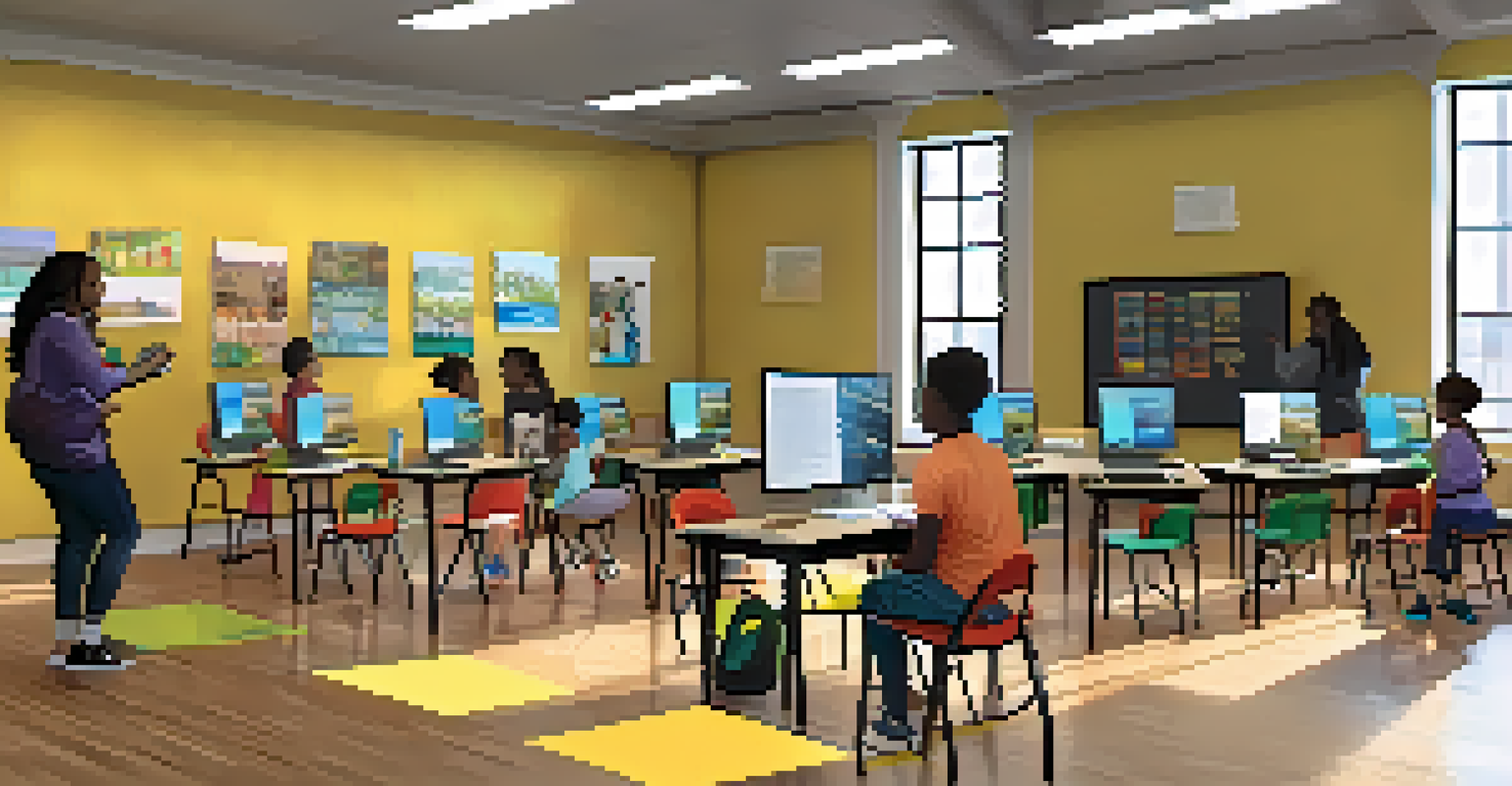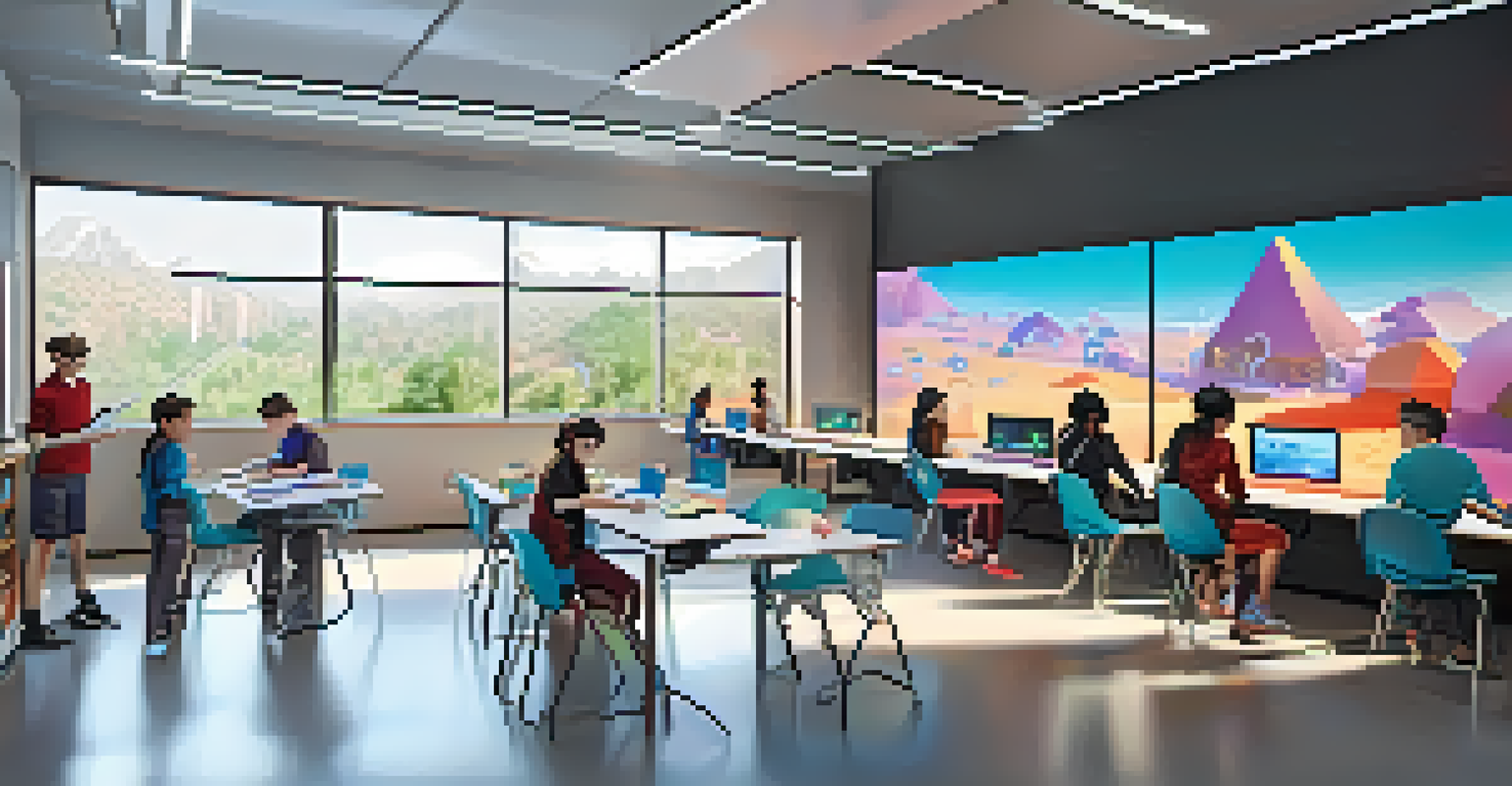The Importance of Digital Literacy in NYC Education

Understanding Digital Literacy in Modern Education
Digital literacy goes beyond just knowing how to use a computer; it encompasses the ability to find, evaluate, and communicate information online effectively. In a city as vibrant and diverse as New York City, this skill is crucial for students to thrive academically and socially. As technology becomes increasingly integrated into our daily lives, understanding how to navigate the digital landscape is essential for future opportunities.
Digital literacy is the key to unlocking the potential of technology in education, allowing students to thrive in an increasingly digital world.
Many students in NYC are growing up in a tech-savvy environment where digital tools are part of their everyday experiences. However, without proper guidance, they may struggle to harness these tools effectively. Digital literacy education helps bridge this gap, ensuring that students become not just consumers of technology, but also critical thinkers and informed users.
Moreover, digital literacy fosters creativity and innovation. By understanding how to use various digital platforms, students can express themselves and collaborate with peers, leading to enhanced problem-solving skills and a greater ability to adapt to changes in the job market.
The Impact of Digital Literacy on Academic Success
Academic success in today's world is increasingly tied to digital literacy. Students who are proficient in using technology for research, communication, and collaboration are often more engaged and perform better in school. For instance, when students can effectively use online resources, their ability to complete assignments and projects improves significantly.

Furthermore, digital literacy equips students with skills that are crucial for higher education. Colleges and universities expect incoming students to be adept in various digital tools, from online learning platforms to collaborative software. By developing these skills early on, NYC students can confidently transition to post-secondary education.
Digital Literacy Fuels Academic Success
Proficient digital skills enhance student engagement and performance in school, preparing them for higher education.
In addition to enhancing academic performance, digital literacy also promotes essential soft skills, such as teamwork and communication. Learning to work with digital tools often requires collaboration, which helps students develop interpersonal skills that are vital in both educational settings and the workplace.
Equity in Education: Bridging the Digital Divide
One of the major challenges in NYC education is the digital divide, which refers to the gap between those who have easy access to digital technology and those who do not. This divide can exacerbate existing inequalities in education, as students without access may fall behind their peers. Addressing digital literacy is crucial in ensuring that all students, regardless of their socioeconomic background, have equal opportunities to succeed.
The future belongs to those who understand digital tools and can harness them to create, collaborate, and innovate.
Many schools in NYC are taking steps to provide students with access to technology and digital literacy programs. By integrating these programs into the curriculum, educators can help level the playing field and prepare students for a technology-driven future. Initiatives like providing laptops or tablets to students can significantly impact their learning experiences.
Additionally, community organizations and local businesses can play a pivotal role in bridging this divide by offering resources and support. Partnerships between schools and tech companies can result in workshops and training sessions that empower students with the skills needed to thrive in a digital world.
Preparing Students for the Future Job Market
The job market is evolving rapidly, with many industries increasingly relying on technology and digital skills. Employers are looking for candidates who not only have a strong educational background but also possess digital literacy skills. By prioritizing digital literacy in education, NYC schools are preparing students for the demands of the modern workforce.
For example, understanding data analysis, social media management, and digital marketing are becoming essential skills in various job sectors. By incorporating these topics into the curriculum, educators are equipping students with the tools necessary to excel in their future careers. This proactive approach helps students remain competitive and adaptable in an ever-changing job landscape.
Bridging the Digital Divide
Addressing access to technology ensures all students, regardless of background, have equal opportunities to succeed.
Moreover, digital literacy fosters a mindset of lifelong learning. As technology continues to evolve, students who are comfortable with digital tools will be more inclined to seek out new knowledge and skills throughout their careers. This adaptability is crucial for professional development and success in any field.
Engaging Parents and the Community in Digital Literacy
Engaging parents and the community is vital in promoting digital literacy among students. When families understand the importance of digital skills, they are more likely to support their children's learning and encourage the use of technology at home. Schools can facilitate this engagement through workshops and informational sessions that teach parents about digital literacy.
Community involvement can also enhance digital literacy efforts. Local organizations can provide resources and training for both students and families, creating a supportive network that fosters digital skills development. Engaging the wider community ensures that digital literacy becomes a shared goal, benefiting all students across NYC.
Additionally, encouraging collaboration between schools and local businesses can lead to mentorship opportunities, internships, and real-world projects. These experiences can further enrich students' understanding of digital literacy and its applications in various professional settings.
Innovative Teaching Methods to Enhance Digital Literacy
To effectively teach digital literacy, educators must employ innovative teaching methods that resonate with today's students. Project-based learning, for instance, encourages students to engage with technology while working on real-life projects. This hands-on approach not only makes learning more enjoyable but also helps students apply their digital skills in practical scenarios.
Incorporating gamification into digital literacy lessons can also enhance engagement. By turning learning into a game-like experience, students are more motivated to participate and develop their skills. This approach can be especially effective in capturing the attention of younger students who may find traditional teaching methods less engaging.
Preparing Students for Future Jobs
Incorporating digital literacy in education equips students with essential skills needed to thrive in a technology-driven job market.
Furthermore, using collaborative tools such as Google Workspace or Microsoft Teams can foster teamwork and communication skills while teaching digital literacy. These tools allow students to work together on projects, share ideas, and develop a sense of community, all while gaining essential digital skills.
The Future of Digital Literacy in NYC Education
As technology continues to advance, the role of digital literacy in education will only become more pronounced. NYC schools must adapt their curricula to include emerging technologies and digital trends, ensuring that students are well-prepared for the future. This forward-thinking approach will empower students to thrive in a rapidly changing world.
Moreover, ongoing professional development for teachers is essential to keep them informed about the latest digital tools and teaching strategies. By equipping educators with the knowledge and resources they need, schools can create a culture of digital literacy that permeates the entire educational system.

Ultimately, fostering digital literacy in NYC education is not just about preparing students for the workforce; it's about empowering them to become informed citizens in a digital society. As we embrace the future, cultivating these skills will be vital for students to navigate the complexities of the digital world and make meaningful contributions to their communities.